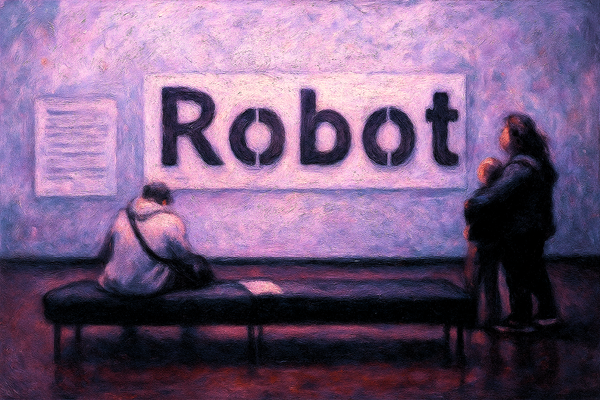Unreal by Design: How Grammar Frames the Mind
What happens to meaning when grammar stops playing by the rules?

It’s no secret that language frames reality. But while individual words can soften, warp, or dramatise meaning, it’s grammatical tense that ultimately filters our perception of it.
In fact, tense captures time—with all its implications—much like music holds emotion. Language is, at its core, a kind of melody, which is why grammatical missteps can sound like jarringly off-key renditions of a contained symphony.
Some might say grammar simply narrates reality, but that's only the surface. Tense goes deeper, threading through responsibility, emotional distance, and the shifting sense of self. It’s as much about psychological positioning as it is about chronology.
1. Time as a Psychological Positioning Tool
Consider a very simple confession. How does the choice of tense shape the emotional weight?
Present Perfect
I have lied to you.
Past Simple
I lied to you.
In both cases, grammar doesn’t just convey an event but alters how it feels. In the present perfect, the lie exists in a kind of ongoing moral present.
It links the past action to the now, suggesting that the lie still matters, that its consequences are still unfolding. The tone feels more confessional, more introspective.
The speaker places themselves within the emotional aftermath. There's a sense of lingering guilt or a need for reconciliation.
In contrast, the past simple frames the lie as a finished act, detached and definitive. The tone is blunter, and the speaker stands outside the event.
But even in these clear contrasts, ambiguity lurks. While "I have lied to you" might sound more repentant, it could just as easily be a calculated tactic, manipulating the listener's emotions.
And while "I lied to you" may feel colder, it can also signal clarity, a bold and unvarnished owning of one’s actions and their moral weight.
2. Dissecting Tense: Temporal Focus in Fragments

To see how grammar shapes our sense of truth and logic, let’s explore a few narrative vignettes. While reading, try to trace your emotional response to the language's slippage.
1.
He’s been gone for weeks, though the mug’s still warm. I rinsed it this morning—maybe yesterday—but I remember the way he held it, left-handed, always balancing it against the edge of the sink like he means to spill something.
I haven’t missed him yet. I don’t think I will. Not until the rain that's already stopped starts falling, or the phone rings like it used to before.
2.
I kissed him before I meant to. Not the first time—we hadn’t met then—but the second, when I still thought I might. He hadn’t looked at me like that yet, not in this version.
I’d planned to forget it, the way you forget the endings of stories you keep rereading. But his hand was already on my back. He knew the way, though it was his first time over. I followed, like I always had.
3.
We never fought. I remember that. He says we did, but I still hear the silence, the soft click of a door that hadn’t closed. I’ve forgiven him for things he hasn’t done yet. I’d already done it the night we stayed in and didn’t speak, though that came after the argument.
I keep telling myself I’m done with this version of him. I was, once. Not yet. Last night, I remembered the way I said goodbye before he left, though we hadn’t made love yet, and that came after his leaving. I don’t think I meant it—but I’d already meant it before.
3. Off-Key Realities
3.1. Language and Position
By breaking the usual rules of time, grammar steps into a more textured, emotional space, where truth, memory, and identity all start to fracture.
Unreliable narration inherently disrupts the narrative logic we rely on, leading to confusion, perhaps even frustration. But as more of the speaker’s psychological topography is gradually revealed, we take on the role of detective or psychologist, scouring deeper.
Take, for example, the tension between "he’s been gone for weeks" and "the mug’s still warm." This temporal paradox creates emotional dissonance: How can he be gone and still feel present?
Later, we encounter a disruption:
“Not the first time—we hadn’t met then—but the second...”
The past perfect ("hadn't met") invalidates the action just declared, hinting at multiple timelines or imagined versions. This temporal slipperiness continues elsewhere, revealing deeper fractures in narrative logic.
Take this line:
“I’ve forgiven him for things he hasn’t done yet."
Though it could easily pass in casual speech, the line is grammatically surreal. The pairing of a past-oriented present perfect (“I’ve forgiven”) with a future-oriented one (“he hasn’t done yet”) unmoors cause and effect, exposing the subtextual instability beneath its logic.
Grammar here isn’t a tool for clarifying events; it’s a means of revealing how uncertain their order—and meaning—truly is.
3.2. Constructing the Real Self

When we twist tense and aspect in subtle ways, we don't just create temporal unease but disrupt the underlying grammar of experience.
The idea is that what we express isn’t just a record of events but an ongoing performance of what's possible and what’s already been. This kind of manipulation doesn’t just alter narrative logic; it reshapes reality itself, for both the speaker and the listener.
In the vignettes above, that reality feels suspended. The sedated logic might suggest mental fog, or simply the intoxication of feeling.
In everyday speech, grammar tends to follow a neat sequence: past, present, and future. But when time is bent, as it is here, the boundaries blur. The narrator’s sense of self, caught in reconstruction, becomes just as unstable.
The past and future wrestle for dominance, leaving the present to flicker—brief, uncertain, fleeting.
Conclusion
Temporal manipulation through grammar is, at its core, a subtle form of emotional manipulation, creating space for unresolved tension and psychological fragmentation.
These shifts act like melodic distortions, deepening resonance beyond surface-level narrative. In fiction, they draw the reader into a more layered understanding of self and reality. But in real life, such distortions can feel hypnotic—persuasive in the way that blurred reason can be.




